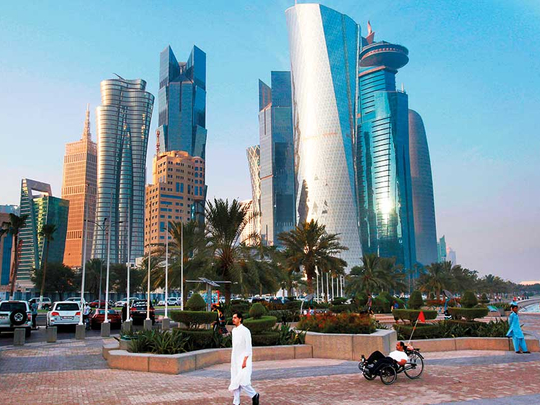
Dubai: The operational risks facing companies in Qatar are on the rise following sanctions implemented at the beginning of June, according to a new white paper from the Economist Intelligence Unit (EIU).
According to the paper, the EIU expects these sanctions to be tightened further as the crisis develops in to a protracted feud.
The EIU “expects the current diplomatic crisis to take years — rather than months — to resolve, owing to the deep level of mutual distrust between Qatar and its Arab neighbours.”
It added in the white paper, released on July 16, that the tensions would threaten stability and “undermine business and investment sentiment in the Gulf region, with Qatar bearing most of the brunt.”
On June 5, Saudi Arabia, the United Arab Emirates, Bahrain and Egypt broke off relations with Doha over what they claim is the country’s destabilising regional policy.
Qatar is accused of supporting militant Islamist groups, including the Muslim Brotherhood. Since then, a group of nations led by the UAE and Saudi Arabia have severed all ties with — and closed transport links to — Qatar, impacting all aspects of business in the tiny nation.
Escalating tensions
The rift has reached new heights in the past weeks with Qatar refusing to comply with a list of demands laid out by the group of Arab nations.
Following this escalation, the EIU expects the conflict to enter a “new phase of tighter economic sanctions on the tiny Gulf state, with far-reaching ramifications for internal stability and business operations.”
In its report, the EIU, the Economist’s research and analysis business, assigns an incredibly low probability to the possibility of military action against Qatar, therefore leaving the Gulf state “subject to the current embargo for an extended period of time [years, rather than months],” inflicting “heavy economic losses on the tiny emirate.”
“Even if a diplomatic resolution is brokered by Kuwaiti mediation, historical tensions and the deep mutual distrust between Saudi Arabia and Qatar mean that diplomatic spats would recur in the future,” the report adds.
The impact on business
In the whitepaper, the EIU warns of the risks of continuing to do business in Qatar. Due diligence must be conducted on local business partners, in order to highlight any potential links to terror organisations, before entering into business agreements or conducting financial transactions.
The report also highlights the higher cost of doing business in the country now. Establishing new distribution channels, for example, will be “costly and time-consuming,” with companies being warned to expect “higher freight costs.”
Another risk that companies face is exposure to fluctuations in the Qatari riyal. Cautioning firms to hedge positions to mitigate riyal risks, the EIU report states that “those considering further investments in Qatar should be careful and take measures to mitigate their exposure to local-currency fluctuations.”
This is because a growing number of foreign banks — outside of Qatar — are no longer buying the Qatari riyal, which they are now seeing as unprofitable to exchange, leading to a drop in its value.
A side effect of this fall in value may be that companies find it harder to attract foreign talent, “as it would undermine the value of worker savings,” the white paper reports.
Borrowing too is likely to be an area of high risk for companies, as banks reduce lending.
The paper states that “Saudi Arabia and the UAE may tighten the embargo by recalling deposits from Qatari banks, which would tighten liquidity conditions further [and make it more difficult to source hard currency].”
Given the heavy dependence of Qatari banks on non-resident deposits, firms investing in the country should aim to avoid a heavy reliance on domestic financing options.
Sector-specific risks
One particularly hard-hit area of business for Qatari companies is tourism, which has been impacted by the closing of airspace and the cancellation of flights to and from multiple countries around the Gulf.
The EIU believes that “the tourism sector [hotels and aviation] is heavily exposed to the crisis as half of the tourists arriving in Qatar are typically residents of the other Gulf Cooperation Council (GCC) states.”
Other sectors which face significant risk, according to the report, are: Construction, infrastructure and World Cup-related projects, and companies in food retail, which “could see their profit margins diminished if the government moves to control inflation through price controls.”











